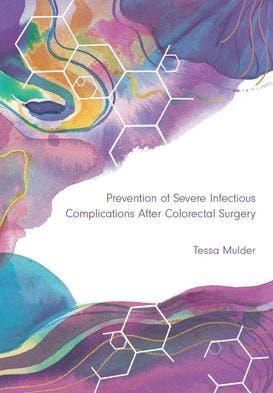Tessa Mulder
Prevention of severe infectious complications after colorectal surgery

- Datum
- (Co) promotoren
- 01-10-2019
- prof.dr. J.A.J.W. Kluytmans, prof.dr. M.J.M. Bonten, dr. M.F.Q. van den Bergh
Samenvatting
In the Netherlands, one in ten patients who undergo colorectal surgery develops a wound infection. These infections have important consequences: they cause pain, extend the length of hospital stay and increase the risk of another surgical intervention. Despite preventative measures, the risk of infection remains high. This thesis aimed to improve infection control for colorectal surgery using two approaches. First, we investigated if we could enhance the efficiency of infection surveillance. We found that 98.5% of infections were detected by an algorithm that uses information from the medical records. Consequently, the time spent on detecting infections was strongly reduced. Secondly, we studied if infections could be prevented with preventative oral antibiotics that are taken before surgery, also called oral antibiotic prophylaxis (OAP). We first studied the impact of OAP in one hospital were OAP was implemented and found that OAP reduced severe wound infections by 42%. We also investigated if OAP is safe by analyzing the blood of patients who took OAP. The antibiotics are thought not to be absorbed by the gut, which strongly lowers the risk of pharmacological side effects. We did not find any traces of antibiotics in the blood, which confirmed our hypothesis. Consequently, we conducted a placebo-controlled trial in six Dutch hospitals to confirm the efficacy of OAP and to thoroughly study the risk of side effects. The trial was prematurely ended as other studies provided evidence for beneficial effect of OAP and it was no longer considered ethical to treat patients with a placebo.
